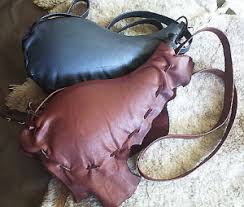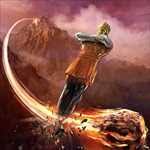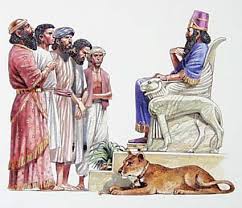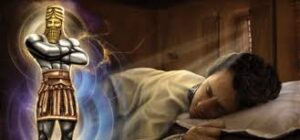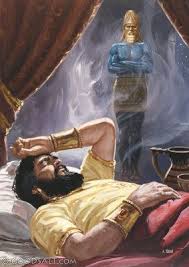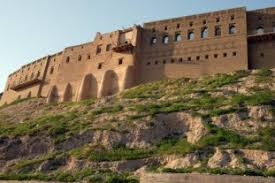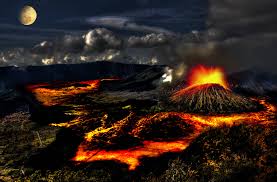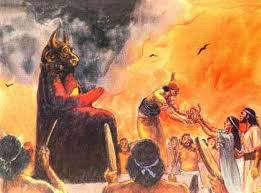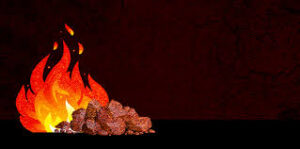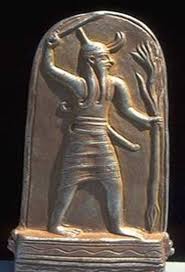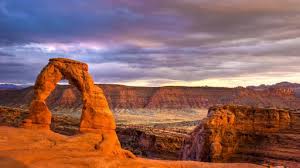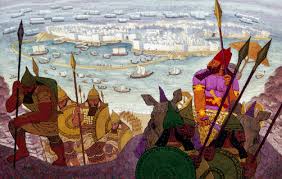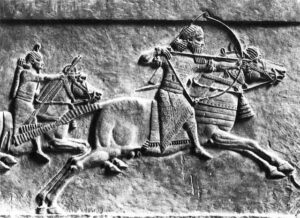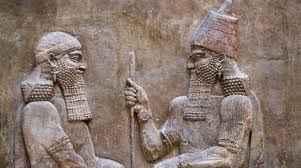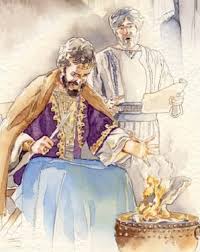Dy – Wineskins and the Threat of Captivity 13: 12-27
Wineskins and the Threat of Captivity
13: 12-27
Wineskins and the threat of captivity DIG: What is the meaning of the parable of the wineskins? Why belabor the obvious? What should be obvious to Judah? Is Judah’s drunkenness literal or figurative? What’s the message in this for Y’hudah to hear? Is there any hope for Judah or is this captivity inevitable? Why would Jeremiah weep secretly (9:1)? Who are the king and queen mother? The defeated were often led naked into captivity. What sense of shame does this fate convey (see 13:22 and 26; Ezekiel 16:36-38)? Is Y’hudah unable to stop sinning (see verse 23)? Is it fair to punish people for acts that Jeremiah seems to consider beyond their control? What had Judah done to deserve this fate?
REFLECT: How do you think Jeremiah felt delivering this kind of message again and again? Why didn’t God just warn Y’hudah once and just lower the boom? What do these repeated warnings tell you about YHVH? How easily do you cry? Has the state of your shul or church ever upset you enough to weep? Why did ADONAI liken the worship of other gods to adultery? What does that tell you about the way He thinks of His relationship to us? Can a leopard change its spots? Is that true of people in general? Of you? Is this verse “hopeless” or do you see it differently? How so?
598 BC during the three-month reign of Jehoiachin
The parable of the wineskins: Jeremiah is to go before the people and recite a very well-known proverbial saying. God told him to say to them, “This is what ADONAI-Tzva’ot says: Every wineskin should be filled with wine.” This riddle seemed designed to evoke an inquiry: If they say to you, “Don’t we know that every wineskin should be filled with wine” (13:12)? In the move from riddle to statement of judgment, however, the language has shifted: Filled with wine has become filled with drunkenness. The latter is a metaphor for destruction. The language suggests bitterness, lack of control, and shame. While we speak of the “cup of blessing” at communion, this is a “cup of cursing” and death (Jeremiah 25:15-29; Mark 10:38-39 and 14:36).
Then Jeremiah was to tell them what the wine represented. It was not physical wine but the wine of the wrath of God. There will be no exceptions. I AM going to fill with drunkenness all who live in this Land, including the kings who sit on David’s throne, the priests who were unfaithful to their high office, the false prophets and all those living in Jerusalem (13:13). There will be ample wine to induce drunkenness.
The notion of drunkenness here is not related to immorality, but to a loss of equilibrium, of being dizzy and unbalanced. The image is of people so unstable, as in a crazy drunk, that they will bump against and hurt each other. They will be helpless, unable to act differently or responsibly. They will be at the mercy of their condition, out of control. I will smash them one against the other, parents and children alike (to see link click Ae – The Problem of Holy War in the TaNaKh), declares ADONAI. So the only One who could save them from their uncontrolled act of self-destruction is God, who made them drunk in the first place. But He will not intervene: I will allow no pity, no mercy or no compassion to keep Me from destroying them (13:14). Her state of drunkenness will be allowed to run its full course.244
The warning against pride: Jeremiah prophesied: Listen (Hebrew: shama) and pay attention, do not be arrogant, for the LORD has spoken. Give glory to ADONAI your God before He brings the darkness, before your feet stumble on the darkening hills. You hope for light, but He will turn it to utter darkness and change it to deep gloom. As travelers hasten to reach safety before darkness overtakes them, so let Y’hudah return to God before the darkness of disaster engulfs her. If you do not listen (Hebrew: shama), I will weep in secret because of your pride; my eyes will weep bitterly (hence, the weeping prophet), overflowing with tears, because the LORD’s flock will be taken captive (13:15-17).
According to these verses there was still time to repent (shuwb). But if Judah did not turn, then the darkness, stumbling, twilight, and gloom was sure to come. God had said: And if that nation I warned repents of its evil, then I will relent and not inflict on it the disaster I had planned (Jeremiah 18:8, 26:3, 35:15, 36:7, for the word relent, also see the commentary on Jonah Ax – The Ninevites Believed God).
Yirmeyahu might appear as a stern prophet – so harsh that he roused the fierce hostility of many people, even his own family. But the driving force of obedience to YHVH, however unpleasant, motivated his harshness. A yearning love for his people inspired him with deep compassion for their woes – even if self-inflicted. In a passage of great tenderness, the Talmud interprets the verse, “As a loving Father sorrowing over his son’s misdeeds for which he had had to punish him, so God weeps in a secret place over Isra’el’s glory that has been taken from her and given to others (Chag. 5b).
The weeping for the royal family: Say to king [Jehoiachin] and to the queen mother [Nehushta], “Come down from your thrones, for your glorious crowns will fall from your heads.” Jeremiah pronounces the demise of the royal family. The cities in the Negev will be shut up, and there will be no one to open them. All Judah will be carried into exile, carried completely away (Jeremiah 13:18-19; Second Kings 24:8-15). This is a rhetorical exaggeration. The complete captivity did not take place until the reign of Zedekiah; nevertheless, the magnitude of the present disaster warranted such a description. Moreover, Jehoiachin and the princes were exiled, which represented the whole nation.
Near Eastern etiquette attached great prominence to the queen mother, as is shown by the frequency with which she is specifically named in the Bible. The prominence would be enhanced in this scene since Jehoiachin was only eighteen years old (see Du – Jehoiachin Ruled For 3 Months in 598 BC). Since kings usually had many wives, not all of them of the same status, the queen mother’s identity was a matter of importance in the succession to the throne.
It is remarkable that the queen mother’s name is given only for the kings of Judah, not those of Isra’el. An exception was Jehoram of Judah, whose mother is not mentioned (Second Kings 8:16). His wife was Ahab’s daughter (Second Kings 8:18) and as a true daughter of Jezebel she may have forced the queen mother into the background who, for that reason, is not named. The queen mothers after that are mentioned for Y’hudah, but not for Isra’el. This seems to indicate that their prominence was confined to the southern kingdom Judah, since Judaism has always paid honor to women. The northern kingdom of Isra’el, on the other hand, which came more strongly under the influence of the surrounding Gentile nations, may have held women in less esteem, in conformity with the general attitude of the ancient world.
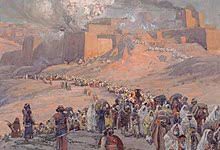
The consequences of their guilt: The people’s sins were responsible for the disaster. What now becomes of the nation? Babylon, the one she once courted, would enslave her. The nation was so deeply dyed with evil, it was doubtful that she could ever be clean again. The readers of Jeremiah in captivity already knew they were taken to Babylon.
Look up and see those who are coming from the north. As if talking to Jehoiachin, the prophet asks: Where is the flock that was entrusted to you, the sheep of which you boasted? What have you done with the people entrusted to your care? The shepherd had left the flock to be destroyed and now was then being held responsible for that failure. What will you say when the LORD sets over you those you cultivated as your special friend? Will not pain grip you like that of a woman in labor (13:20-21)?
Jerusalem had committed spiritual adultery. And if you ask yourself, “Why has this happened to me?” – it is because of your many sins that your skirts are pulled up and you have been violated (publically disgraced like a common prostitute). The problem, the root problem was their pride. The idolatry was merely a symptom of their pride. It infected their whole culture. As a result, judgment was inevitable . . . irreversible. Can an Ethiopian change his skin or a leopard its spots? No. Neither can you do good who are accustomed to doing evil (13:22-23). Doing evil had become so ingrained in the people of Judah that they couldn’t do anything else but do evil. Judah was so steeped in evil, it was almost impossible for her to return to righteousness.
The result of this massive and irreversible disobedience is presented in three different metaphors. First, the disobedient people will be blown like chaff. The image echoes Psalm 1:4 and refers to being scattered. Thus, this picture is yet another way of speaking of the exile. ADONAI declared: I will scatter you like chaff driven by the desert wind.
The second metaphor speaks of land allotment. This is your lot, your punishment, the portion I have decreed for you,” declared ADONAI, because you have forgotten Me and trusted in false gods. The picture is used ironically here, for the portion given is now exiled land, that is, land that is ritually unclean and religiously worthless.
The third metaphor is that of a prostitute. I will pull up your skirts over your face that your shame may be seen – your adulteries and lustful neighings, your shameless prostitution! I have seen your detestable acts on the hills and in the fields, your favorite places to worship other gods. Woe to you, Jerusalem! How long will you be unclean (13:24-27)? How long will it be before judgment finally strikes (see Gb – The Destruction of Solomon’s Temple on Tisha B’Av in 586 BC)? Jeremiah had to rest in the promise of a future restoration (31:31-34).




